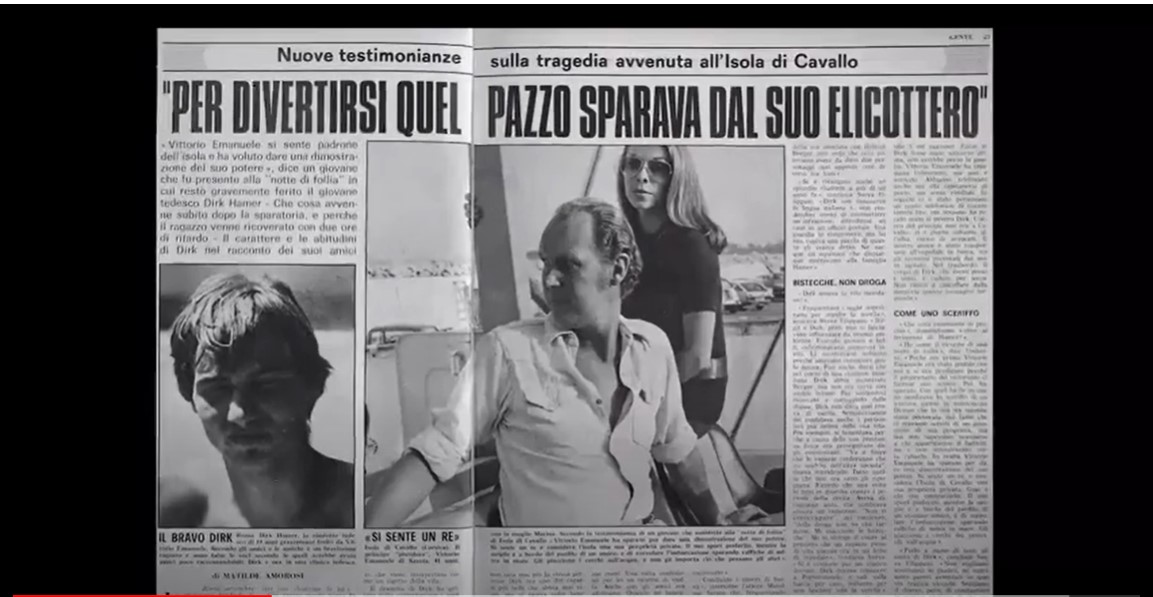The Savoia Italian royal family has been plagued with scandals and controversies. The only reason we don’t hear much about them is because they are not as relevant as say, the British royal family. But those familiar with their history know that there is quite a bit of unsavoriness attached to them.
On May 9, 1946, in a last-ditch attempt to save the monarchy, Vittorio Emanuele formally abdicated in favor of his son, who became Umberto II. It didn’t work; the Italian constitutional referendum was won by republicans with 54% of the vote. Vittorio Emanuele went into exile in Egypt along with his family, dying there a year later. By the time of the referendum Benito Mussolini was dead and discredited and the last royals were deemed to have been too close to infamous dictator. The Italian people turned against them and the Italian constitution contains a clause stripping the Savoy family of their wealth in exile.
The scandals have been many: direct descendants are divided over who should lead the family and for decades they have battled against each other for the non-existent throne; Vittorio Emanuele, Prince of Naples and self-declared heir, has been racking up scandals, with accusations of racketeering, anti-semitism and even murder.

The fact that he was acquitted of all charges following trials has done nothing to diminish the disagreeable publicity. His heir, Prince Emanuele Filiberto, has gone from wannabe showman to aspiring politician–all without much success. In 2007, father and son, Vittorio Emanuele and Emanuele Filiberto, sued the Italian government for 260 million dollars, claiming that to send them into exile “violated their human rights”.
In reply, one official in Prime Minister Romano Prodi’s office was quoted as telling Italian state television that Italy may now turn around and seek damages from the Savoy royals over historic grievances.
Now Netflix has commissioned a docuseries that delves into the history of the Savoy family with a focus on the most sensational scandal of all.
https://www.youtube.com/watch?v=d7azvyu4gqs
In 1978, Vittorio Emanuele of Savoy, the exiled heir to the Italian throne, was arrested for the killing of 19-year-old German vacationer Dirk Hamer who was fatally shot while asleep on a yacht on Isola di Cavallo, a small island in the Mediterranean Sea located between Corsica and Sardinia.
Eventually Vittorio Emanuele was acquitted of all charges in 1991. However, since then there have been continued accusations that he used the power behind his name to avoid conviction. Despite the fact that he first admitted in a letter of civil liability to Hamer’s death, and years later was caught on camera “boasting” of the killing in 2006, and of having fooled the French judges who acquitted him, in public he has denied any guilt and proclaims, “I have no remorse for anything.”
“A prince in exile, a top model, a gunshot in the dark that changed the lives of so many people, for generations to come. Starting with the events that happened on the tragic night of August 18, 1978 at Cavallo Island, ‘The King Who Never Was’ traces the story of Vittorio Emanuele di Savoia, the last heir to the throne of Italy,” reads the blurb on the trailer.
From that starting point, journalist, producer and director, Beatrice Borromeo–who incidentally is of an equally illustrious family and also married to Princess Caroline of Monaco’s son, Pierre Casiraghi—develops a more intimate tale, of his troubled relationship with his parents, his love story with Marina Doria, his years working in Iran, his scandals and much more. The through line remains that he has no recollection of having done it and therefore someone else must be guilty.

Speaking to Paris Match about The King Who Never Was, Borromeo admitted that, “Since the day I was born, I have been hearing about this Hamer affair. Unconsciously, this shaped me: I wanted to be a journalist to fight against injustice.”
It is also relevant that her mother has always been good friends with Dirk Hamer’s sister, Birgit who fought for decades to get justice for her brother, and therefore the tragedy has been ever present in their family relationships. Indeed, Borromeo has said in interviews that for years she chastised herself with: “There was always this feeling of: ‘Enough with this! It’s too old, you are becoming obsessed!’”
So why has she made this docuseries now? In the past, Borromeo avows, “I wrote some pretty aggressive articles that lacked the necessary balance that I think I have now found in this documentary series.”
The viewer may have different ideas about whether she has found that balance, nevertheless, despite the fact that this story is not new, there was still much to mine in it. It brings another perspective to the question of Vittorio Emanuele’s guilt as Borromeo gives him free rein to express himself in ways that end up showing obtusity and remorselessness.












